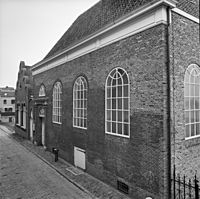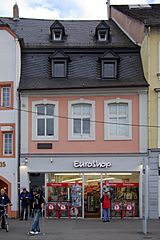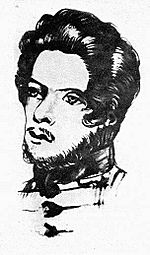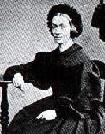Henriette Pressburg facts for kids
Quick facts for kids
Henriette Pressburg
|
|
|---|---|
| Born | 20 September 1788 |
| Died | 30 November 1863 (aged 75) Trier, Prussian Rhineland
|
| Nationality |
|
| Known for | Mother of Karl Marx |
| Spouse(s) | Heinrich Marx |
| Children | 8 (including Karl Marx and Louise Juta) |
| Parent(s) | Isaac Heymans Pressburg Nanette Salomons Cohen |
| Relatives | Laura Marx (granddaughter) Eleanor Marx (granddaughter) Jenny Longuet (granddaughter) Henry Juta (grandson) Lion Philips (brother-in-law) Anton Philips (great-nephew) Gerard Philips (great-nephew) Jean Longuet (great-grandson) |
Henriette Pressburg (born September 20, 1788 – died November 30, 1863) later became Henriette Marx after she got married. She was the mother of Karl Marx, a famous thinker who developed ideas about communism and economics.
| Top - 0-9 A B C D E F G H I J K L M N O P Q R S T U V W X Y Z |
Henriette's Early Life and Family
Henriette Pressburg was born in Nijmegen, Netherlands, on September 20, 1788. She was the second of five children. Her parents were Isaac Heymans Pressburg and Nanette Salomons Cohen.
Her family was quite wealthy. Her father, Isaac, worked as a textile merchant. They were important members of the Jewish community in Nijmegen. Henriette's grandfather was a rabbi, and her father was a cantor at the local synagogue.
Marriage and Moving to Trier
On November 22, 1814, Henriette Pressburg married Hirschel Marx in the Nijmegen Synagogue. She received a large dowry of twenty thousand guilders. After their wedding, the couple moved to Hirschel's hometown, Trier, in what was then the Prussian Rhineland.
In Trier, Hirschel became a successful lawyer. They had nine children together, four sons and five daughters. Sadly, two of their sons died when they were young. Their third child, Karl, was born on May 5, 1818. In 1819, the family moved into a large house with ten rooms. This house was across from an old Roman gate called Porta Nigra. Henriette lived there with her family for 23 years.
Family's Change of Faith
Around 1817, Henriette's husband, Hirschel, changed his name to Heinrich. He was baptized into the Lutheran Church. Their children followed and were baptized in August 1824. Henriette was baptized a year later, in November 1825.
This change caused a complete break with Heinrich's family, as his father was the rabbi of Trier. However, Henriette stayed in close touch with her own family in the Netherlands. Her fourth child, Hermann, was born during a visit back to Nijmegen in August 1819.
In May 1838, Heinrich died from tuberculosis. Henriette was left with six of their children still living at home. Even though she had inherited a good amount of money, the family lived carefully and saved their money.
Henriette's Relationship with Karl Marx
Karl was the third child of Henriette and Heinrich Marx. After finishing school in Trier in 1835, Karl went to the University of Bonn. Later, he moved to the University of Berlin.
Henriette worried about Karl's life away from home. She was concerned about his health and his spending habits. She often wrote letters to Karl, telling him how important it was to be clean and healthy. She advised him to keep his rooms tidy and to wash regularly with soap and a sponge.
When Karl wrote to his father about his health, Henriette also gave him advice. She told him to avoid things that could make him sick, like too much wine or coffee. She also told him not to smoke, stay up late, or eat spicy foods. She reminded him to be careful not to catch a cold and not to dance until he felt better.
Karl did not often write back to his family or visit them. After his father died in 1838, Karl's relationship with his mother became more difficult. He often asked her for money from his future inheritance. This made their relationship cold and distant.
In 1842, Karl stayed in Trier for six weeks after his brother Hermann died. He also attended his sister Sophie's wedding. Things did not go well with his family. Karl felt that his family made things difficult for him, even though they were well-off. Because of disagreements, Karl moved from the family home to a guest house during his stay. The next year, Karl married Jenny von Westphalen. Neither Henriette nor any other family member attended the wedding.
Over the years, Karl often complained that his mother did not help him with his money problems. He told friends that he couldn't use his inheritance while she was alive. Henriette believed he should work harder to earn money. She once joked, "if only Karl had made Capital, instead of just writing about it."
However, she did send him money sometimes. In 1848, when Karl was living in Brussels, she sent him 6,000 francs. The police in Belgium thought the money might be for a revolutionary group. They asked the Trier authorities to question Henriette. She explained that her son had been asking for money for his family, and it was an advance on his inheritance. The police accepted her explanation.
In 1861, Karl visited Germany again after being exiled in the 1850s. He spent two days with Henriette in Trier. She agreed to cancel some of his old debts. But when he visited again in August 1862, she refused to give him any more money. This was the last time Henriette saw her son. She died fifteen months later. Karl traveled to Trier for her funeral.
Henriette's Sister Sophie and the Philips Family
In 1820, Henriette's younger sister, Sophie Pressburg, married a tobacco merchant named Lion Philips. They married in the Nijmegen synagogue and then moved to Zaltbommel in the Netherlands.
After their mother died in June 1833, Henriette agreed that Lion Philips would manage their parents' inheritance for the whole family. Lion also managed Henriette's will after she passed away.
The Philips family got along well with Karl Marx, who was their nephew. Karl sometimes stayed with them in Zaltbommel. He often wrote letters to Lion Philips and frequently borrowed money against his inheritance, especially after he moved to London in 1849.
Lion and Sophie's grandson, Gerard, and his son Frederik founded the famous Philips Electronics Company in 1891. Gerard's younger brother, Anton, joined the company in 1912.
Henriette's Personality and Views
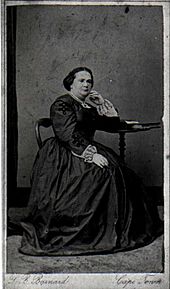
Henriette was the last in her family to be baptized in November 1825. This was more than a year after her children and about eight years after her husband. She grew up in a strict Jewish home. She seemed to be more connected to Jewish culture than her husband. She might have kept some Jewish traditions in her Protestant family. She was clearly more religious than her husband. She once told friends, "Yes, I believe in God, not for God's sake, but for my own."
Henriette was never fully comfortable writing or speaking High German. Some people who wrote about Marx described Henriette as not very educated. This idea came partly from her letters, which had grammar mistakes and little punctuation. However, her German might have been imperfect because Yiddish was her first language. Also, she grew up in the Netherlands and only moved to a German-speaking city when she was in her mid-twenties. She always felt a bit like an outsider in Trier. She was very close to her own family and her home country.
Henriette's main focus was taking care of her large family. Over the years, her family faced illnesses and many sad losses. Five of her nine children died before she did. She admitted to having "excessive mother love." Her husband, Heinrich, also wrote to their son Karl that "you know your mother and how anxious she is."
Her daughters spoke positively about her. Emilie said her "dear mother enjoyed life and was an angel in going without if necessary and in dealing with family bereavement." Sophie described her as "small and delicate, and very intelligent." Sophie also said Henriette was "a good housekeeper, who knew how to manage her inheritance and left her children with a greater sum than she herself inherited. She handled money better than her famous son Karl Marx.’’
Henriette's Final Years
Henriette Marx continued to live in Trier. She passed away on November 30, 1863, at the age of 75. She was buried in the Protestant cemetery after a service at the Lutheran Church of the Redeemer.
She left a good amount of money to her four surviving children. However, much of Karl's share was used to pay off his debts to his uncle Lion Philips.
 | Leon Lynch |
 | Milton P. Webster |
 | Ferdinand Smith |


